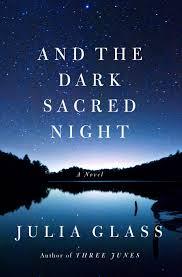
By Julia Glass
(Pantheon)
Julia Glass can really do geezers. Her sure hand with the voices and idiosyncrasies of older men is the strongest thing about “And the Dark Sacred Night,” the third in a trio of novels featuring gay Scottish bookseller Fenno McLeod. He debuted in Glass’ National Book Award-winning “Three Junes” (2002), then returned in “The Whole World Over” (2006), where he got a boyfriend, a bantering, nurturing Greenwich Village restaurant owner named Walter.
Now Fenno and Walter are secondary players in a cast that includes a crusty Vermont outdoorsman, Jasper Noonan, and a post-stroke state senator, Zeke Burns. Zeke is the father of art critic Malachy Burns, who died of AIDS in “Three Junes.” Malachy plays a key posthumous role in the current novel as well.
Unfortunately, the character at the center of the new plot is the weakest of the troupe. Kit Noonan, adoptive son of Jasper Noonan, is a 42-year-old art historian who lives in New Jersey with his wife and twins. He’s a bit of a drip, and it’s hard to understand why his once-teenage and single mom has permanently refused to reveal who his biological father is, and why his wife thinks it’ll solve his unemployment and depression problems if he finds out.
If the paternity-mystery plot line of this book doesn’t have enough mojo, the character development is so rich, the Vermont and Provincetown settings so vivid, and the relationships so carefully shaded that it remains an engrossing read. For example, Walter, the endearing restaurateur, is unrelentingly peevish about Fenno’s long-ago friendship with Malachy. When Malachy, along with a list of others lost to AIDS, is remembered with a toast at a survivor’s 60th birthday party, Walter kvetches, “Can we move on a little here? If I want to visit the Quilt, I’ll get on a plane to San Francisco. Or DC. Wherever it is.” One of the points of “And the Dark Sacred Night” is that people are defined as much by their flaws as their assets ― in fact, in relation to another character, a Catholic activist, it is observed that “saints ... fall hard. Saints are merely tyrants in the kingdom of virtue.”
As for the title, it is explained by Walter and Fenno’s therapist. It’s a lyric from the Louis Armstrong song “What a Wonderful World” ― “the bright blessed day and the dark sacred night.” “The past is like the night: dark yet sacred,” says the therapist, underlining the importance of unraveling one’s history. Good old Fenno nearly bolts from the office at that point.
It’s kind of odd that the strongest characters in the book have an ironic relationship to the somewhat gooey wisdom it imparts. But the odd moments in this novel are its best. (MCT)
-
Articles by Korea Herald







![[Graphic News] More Koreans say they plan long-distance trips this year](http://res.heraldm.com/phpwas/restmb_idxmake.php?idx=644&simg=/content/image/2024/04/17/20240417050828_0.gif&u=)
![[KH Explains] Hyundai's full hybrid edge to pay off amid slow transition to pure EVs](http://res.heraldm.com/phpwas/restmb_idxmake.php?idx=644&simg=/content/image/2024/04/18/20240418050645_0.jpg&u=20240419100350)






![[From the Scene] Monks, Buddhists hail return of remains of Buddhas](http://res.heraldm.com/phpwas/restmb_idxmake.php?idx=652&simg=/content/image/2024/04/19/20240419050617_0.jpg&u=20240419175937)

![[KH Explains] Hyundai's full hybrid edge to pay off amid slow transition to pure EVs](http://res.heraldm.com/phpwas/restmb_idxmake.php?idx=652&simg=/content/image/2024/04/18/20240418050645_0.jpg&u=20240419100350)

![[Today’s K-pop] Illit drops debut single remix](http://res.heraldm.com/phpwas/restmb_idxmake.php?idx=642&simg=/content/image/2024/04/19/20240419050612_0.jpg&u=)